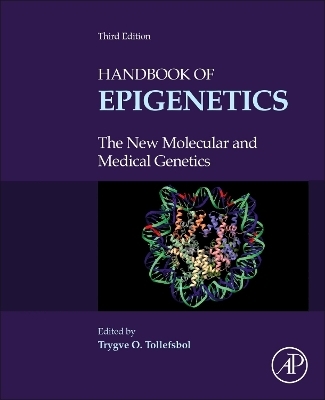
Handbook of Epigenetics
Academic Press Inc (Verlag)
978-0-323-91909-8 (ISBN)
In addition, this edition has also been enhanced with step-by-step instructions in research methods, as well as easy-to-digest disease case studies and clinical trials that provide context and applied examples of recent advances in disease understanding and epigenetic therapeutics. These features empower researchers to reproduce the approaches and studies discussed and aid clinical translation. Live links across chapters tie in relevant external datasets and resources.
Dr. Tollefsbol is a Distinguished Professor of Biology and a Senior Scientist in the O’Neal Comprehensive Cancer Center, Integrative Center for Aging Research, Nutrition Obesity Research Center, University Wide Microbiome Center, and the Comprehensive Diabetes Center at the University of Alabama at Birmingham (UAB). He is Director of the UAB Cell Senescence Culture Facility which he established in 1999. Dr. Tollefsbol trained as a Postdoctoral Fellow and Assistant Research Professor with members of the National Academy of Science at Duke University and the University of North Carolina. He earned doctorates in molecular biology and osteopathic medicine from the University of North Texas Health Sciences Center and his bachelor’s degree in Biology from the University of Houston. He has received prior funding from the NCI, NHLBI, NIMH and other federal institutes as well as the Glenn Foundation for Medical Research, Susan G. Komen for the Cure, the American Federation for Aging Research (AFAR), and the American Institute for Cancer Research (AICR) among many other sources.
1. Epigenetics Overview
SECTION I: Molecular Mechanisms of Epigenetics 2. Mechanisms of DNA Methylation and Demethylation during Mammalian Development 3. Mechanisms of Histone Modification 4. The Epigenetics of Non-coding RNA 5. Prions and Prion-like Phenomena in Epigenetic Inheritance 6. Higher-order Chromatin Organization in Diseases 7. Polycomb-group Proteins and Epigenetic Control of Gene Activity
SECTION II: Methods in Epigenetics 8. Methods for Assessing DNA Cytosine Modifications Genome-wide 9. Analyses of Genome-wide Histone Modifications in the Mammalian Genome 10. Techniques for Genome-wide Expression of Non-coding RNA 11. Computational Epigenetics
SECTION III: Model Organisms of Epigenetics 12. Epigenetics of Lower Organisms 13. Drosophila Epigenetics 14. Models of Mouse Epigenetic Inheritance: Classification, Mechanisms, and Experimental Strategies 15. Plant Epigenomics
SECTION IV: Factors Influencing Epigenetic Changes 16. Dynamic Changes in Epigenetic Modifications During Mammalian Transitions 17. Epigenetic Biomarkers 18. Transposable elements shaping the epigenome 19. Metabolic Regulation of DNA Methylation in Mammalian Cells 20. Dietary and Metabolic Compounds Affecting Covalent Histone Modifications 21. Epigenetics, Stem Cells and Cellular Differentiation 22. Regeneration Epigenetics 23. Epigenetics of X-chromosome Inactivation 24. Epigenetics of Memory Processes 25. Transgenerational Epigenetics 26. DNA Methylation Clocks in Age-related Disease
SECTION V: Evolutionary Epigenetics 27. Evolution of Epigenetic Mechanisms in Plants 28. Evolution of Epigenetic Mechanisms in Animals and Their Role in Speciation 29. Adaptive Evolution and Epigenetics
SECTION VI: Epigenetic Epidemiology 30. Epigenetics of Livestock Breeding 31. Nutritional Epigenetics and Metabolic Syndrome 32. Epigenetics of Drug Addiction 33. Environmental Influence of Epigenetics 34. The Gut Microbiota Influence on Human Epigenetics, Health and Disease 35. Population Pharmacoepigenomics
SECTION VII: Epigenetics and Human Disease 36. Cancer Epigenetics 37. The Role of Epigenetics in Autoimmune Disorders 38. Epigenetics of Brain Disorders 39. The Epigenetics of Metabolic Diseases 40. Imprinting Disorders in Humans
SECTION VIII: Epigenetic Therapy 41. DNA Demethylating Agents in Clinical Medicine 42. Clinical Applications of Histone Deacetylase Inhibitors 43. Combination Epigenetic Therapy
SECTION XI: The Future of Epigenetics 44. New Directions for Epigenetic Research: Application of Engineered DNA-binding Molecules to Locus-specific Epigenetic Research
| Erscheinungsdatum | 16.09.2022 |
|---|---|
| Verlagsort | Oxford |
| Sprache | englisch |
| Maße | 216 x 276 mm |
| Gewicht | 2400 g |
| Themenwelt | Informatik ► Weitere Themen ► Bioinformatik |
| Naturwissenschaften ► Biologie ► Genetik / Molekularbiologie | |
| ISBN-10 | 0-323-91909-X / 032391909X |
| ISBN-13 | 978-0-323-91909-8 / 9780323919098 |
| Zustand | Neuware |
| Informationen gemäß Produktsicherheitsverordnung (GPSR) | |
| Haben Sie eine Frage zum Produkt? |
aus dem Bereich


